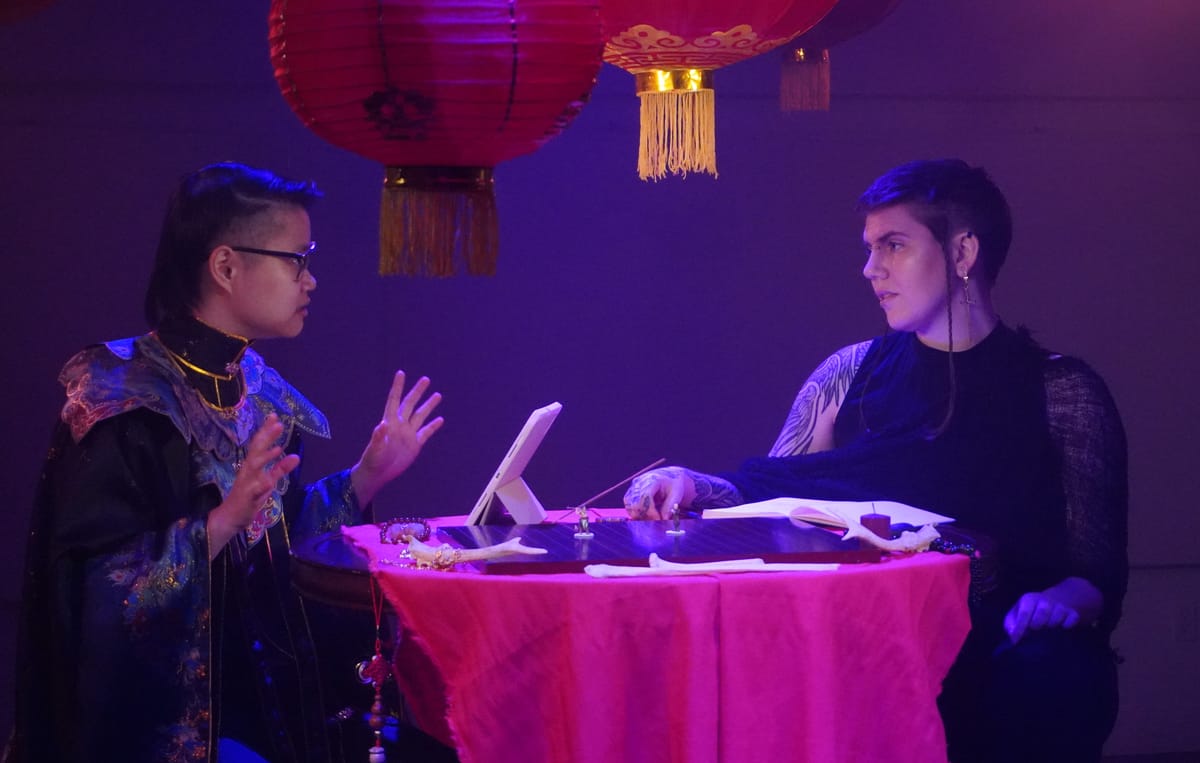Godkiller: Last Hope is the beginning of a new cycle for Transplanar
Connie Chang and Sea Thomas’ first in-studio foray is a divine cinematic experience

“This is not a story about killing Gods,” says God, speaking solemnly to the camera.
“Yes, it is,” counters the Godkiller, their back to us, to God.
“This is not a story about redemption,” God says, ignoring the Godkiller.
“Yes,” the Godkiller says, turning to face God, their voice brimming with resentment and desperation. “It is.”
The two make eye contact for the first time, and the cosmic cycle starts anew. That is how Godkiller: Last Hope begins.

In the first in-studio actual play from Transplanar, Connie Chang and Sea Thomas star as God and Godkiller, delivering a medium-pushing story of devotion, community, and maybe redemption. From the moment this eight episode series begins, we are consumed by the universes that have been built, destroyed, and built again from the minds of these two actual play trailblazers.
We follow the cycle of Litany, a Godkiller made from the rib of the Queen of the Underworld. Last Hope begins with their hands thrust into the Empress of Heaven's heart, failing to do the one thing they have been created for: to kill her. The stakes could not be higher, and within the first five minutes of this actual play, we as the audience have a clear understanding of the dynamic between these two diametrically and divinely opposed characters, and the hook is powerful enough to pull you through the hour-long first episode with a profound hunger for more.
Every element of Last Hope, from technical production to performance, is brimming with a single, unified artistic vision. The set is a minimalistic black box stage with flairs of Chang’s Chinese diasporic influences. Red lanterns hang from the ceiling, framing the top of the screen in multiple layers of foreground and background like a theater’s proscenium arch. Chang is dressed in elegant regalia while Thomas wears a more unassuming mercenary look. As the story progresses, the performances between Chang and Thomas create a gravitational pull that is impossible to escape, and why would you? These are two artists performing at the peak of their craft, with a team of creatives behind the camera to support and uplift each creative choice.
The multi-camera work and editing by Ryan Gibeau is a distinctly cinematic experience. A screener provided to Rascal, though only an early story cut, utilized film techniques that added a clear thematic connection between the story being told and the meta-story of its creation—a uniquely actual play experience. Gibeau cuts between various angles to indicate a transition between in and out of character moments, shifting in tone from epic drama—such as a close up of God’s hand as they mime pulling a legendary sword from its sheath—to playful character dialogue—with rapid, shifting pans between the Godkiller and Tiansheng, a mortal cultivator based off the Monkey King—as the moment calls for.
Rascal sat down with Chang and Thomas to discuss Transplanar’s first venture into studio production, the deconstruction of the game master-player power dynamic through Godkiller, and Chang’s Chinese diasporic inspirations.
This interview has been edited for clarity, length, and flow.





